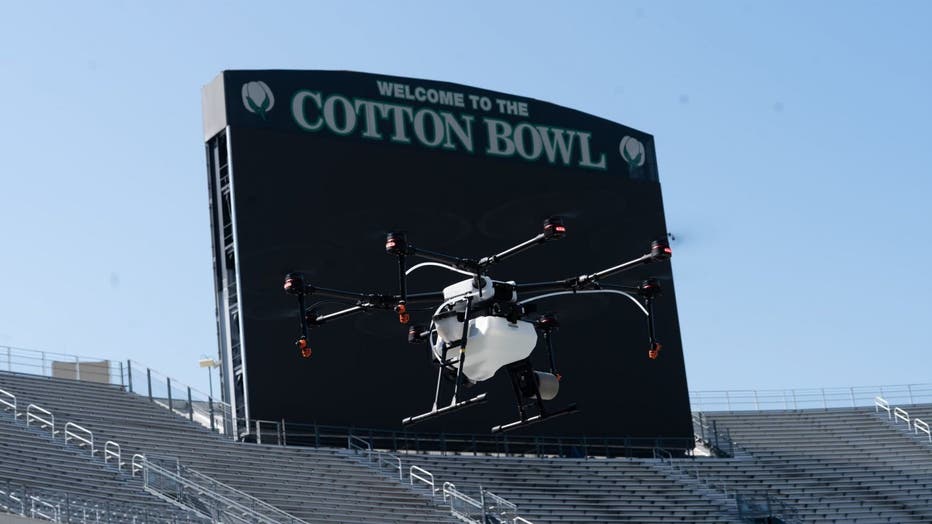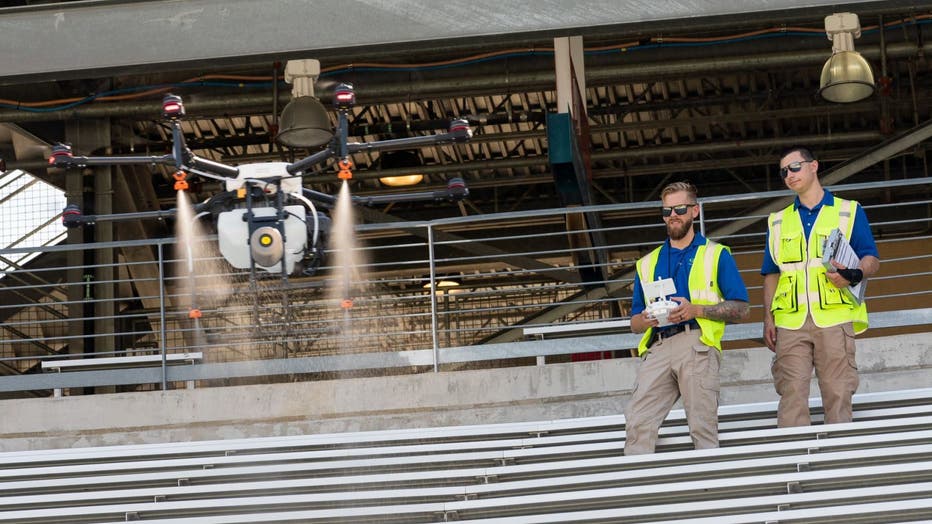Texas stadiums to use disinfectant-spraying drones to fight coronavirus
R-Water is a disinfectant that is being sprayed from drones to disinfect outdoor event spaces. (Photo: Fox News)
DALLAS - Stadiums are looking for ways to bring fans back to the stands in time for fall sports despite the coronavirus outrbreak, leading some Texas facilities to turn to drones for help.
Cotton Bowl senior marketing director Julian Bowman describes the feeling of seeing the iconic Cotton Bowl Stadium in Dallas empty for the last few months, saying, “It is a weird feeling.”
“The Cotton Bowl opened up in 1930, so this was our 90th year and it was set to be our best year ever and unfortunately with COVID we are not able to do that,” Bowman said. “It has really affected how we have been able to connect with our sports community and our entertainment community.”
The Cotton Bowl, located in Fair Park in Dallas, is home to the Red River Rivalry. Every year in October, the University of Texas Longhorns and the Oklahoma University Sooners face off at the stadium, but COVID-19 has left the fate of sports at the Cotton Bowl and other stadiums across the country up in the air.
Related: Planet Fitness will require face masks inside gyms starting August 1
The uncertainty has led the stadium to turn to technology for help, hiring Arvika Aerial Tech and R-Water to help bring back fans and spectators.
“It is a little bit weird for us because we are in the business of people-gathering,” Bowman said. “We are looking for unique ways to get people here to gather at Fair Park and get the Cotton Bowl ready for sports which is why we are working with the companies.”

Texas-based drone company partners with Texas-based disinfectant company to fight COVID-19 at large event centers. (Photo: Fox News)
The Cotton Bowl is teaming up with the two companies to start cleaning the stadium using a disinfectant sprayed from drones.
Paul Woessner, the vice president of Texas-based Arvika Aerial Tech, said his drones typically have been used for agriculture, but the COVID-19 pandemic created a new avenue in disinfecting for the company.
“We have married together the latest technology with ‘precision-ag’ drones and disinfectant,” Woessner said. “We watched high schools cancel things this spring and it was just a natural step to see if we can take our business out of the cornfield and into the football stadium to make a difference.”
The company would test 20 different areas before starting to disinfect, calling these areas “sample zones.” When the drone is done disinfecting, workers would swab again to make sure the bacteria in the sample zone was gone.
“With one pass, we can hit about four rows as opposed to a person going and having to do each one by themselves,” Woessner said.
Each drone cost roughly $20,000 and could be used for indoor and outdoor disinfecting. The drones will be spraying R-Water as the disinfectant, in a partnership that started in the spring of 2020.
Related: Growing list of NFL players reportedly opting out of 2020 season over COVID-19 concerns
“Schools and sports, they weave our cultures together so when we can bring them back, we can bring America back,” R-Water founder Rayne Guest said. “Our product has a one minute contact time, unlike most, which have a 10 minute contact time, which means you have to let the product sit that long before it kills anything.”
R-Water is currently being used in several schools in Texas, including Texas State University and most recently Southwestern University in Georgetown.
“In schools, we are using a device that we install that produces 300 gallons of disinfectant and 100 gallons of all-purpose cleaner and degreaser in 24 hours so we install the system in school so the janitorial staff can use it,” Guest said.
The R-Water founder added that normally the product would be used in backpacks in the stadiums, but, for the first time, the product will now be used in the drones.
“This is the first time that we are adding drone use to our arsenal, which is really exciting for us,” Guest said. “There will be other areas in a stadium, like the bathrooms and the food-service areas that people will use the product in spray bottles and pump sprayers.”
The Cotton Bowl typically would hold just over 92,000 people, with an event space of this size, the drone should be able to disinfect it in about four hours.
“We think it is part of the puzzle to get the public back to where you and I will set next to each other at a football game or something,” Woessner said.
Related: Rep. Louie Gohmert tests positive for coronavirus before planning to fly with Trump to Texas
Jason Reagan, a longtime contributor to Drone Life, said a company in New York has been doing something similar.
“You already had a lot of drone companies that were doing crop spraying with drones, so that lends itself very well and makes disinfecting very easy in terms of pivoting,” Reagan said.
Reagan also added that drones have played a pivotal part in helping the world recover from the COVID-19 pandemic.
“The real area where drones are making a huge difference is in the delivery area,” Reagan said. “Companies have been able to deliver PPE [personal protective equipment] to areas that it may be hard for vehicles to get to.”

Drone operators are practicing inside the Cotton Bowl stadium, waiting for FAA approval. (Photo: Fox News)
Reagan did stress that only a “specialized drone” had the capability of doing this, citing that the drone needed to be able to carry a lot of weight and have a lot of horsepower.
“It is something that is starting and some companies are adapting and are able to bring that into the drone space, but it is still in the early stages,” Reagan said.
Cotton Bowl officials added that they will be following all Centers for Disease Control and Prevention (CDC) guidelines when they are able to reopen. Spectra, the managing company for Fair Park, gave a statement to Fox News: “Spectra’s focus on the health and safety of our employees, guests, performers, athletes, and partners continues to drive every aspect of our meticulous preparation to responsibly and safely welcome back crowds to Cotton Bowl Stadium and Fair Park. In addition to testing out innovative solutions like the collaboration between R-Water and Arvika, we continue to work on a comprehensive re-opening plan that includes health screenings, enhanced cleaning procedures, social distancing and employee training, among other protocols.”
For now, the drones at the Cotton Bowl will be practicing, spraying only water as officials wait for the Federal Aviation Administration to approve the use of the disinfectant, a decision expected in the next 90 days. Arvika Aerial Tech drone operators have been working with drones in the Cotton Bowl to test battery life and find the most effective use of the disinfectant.
The drones will also be used at the Toyota Stadium in Frisco, Texas, and should also be approved to spray indoors by the end of July, officials said.

